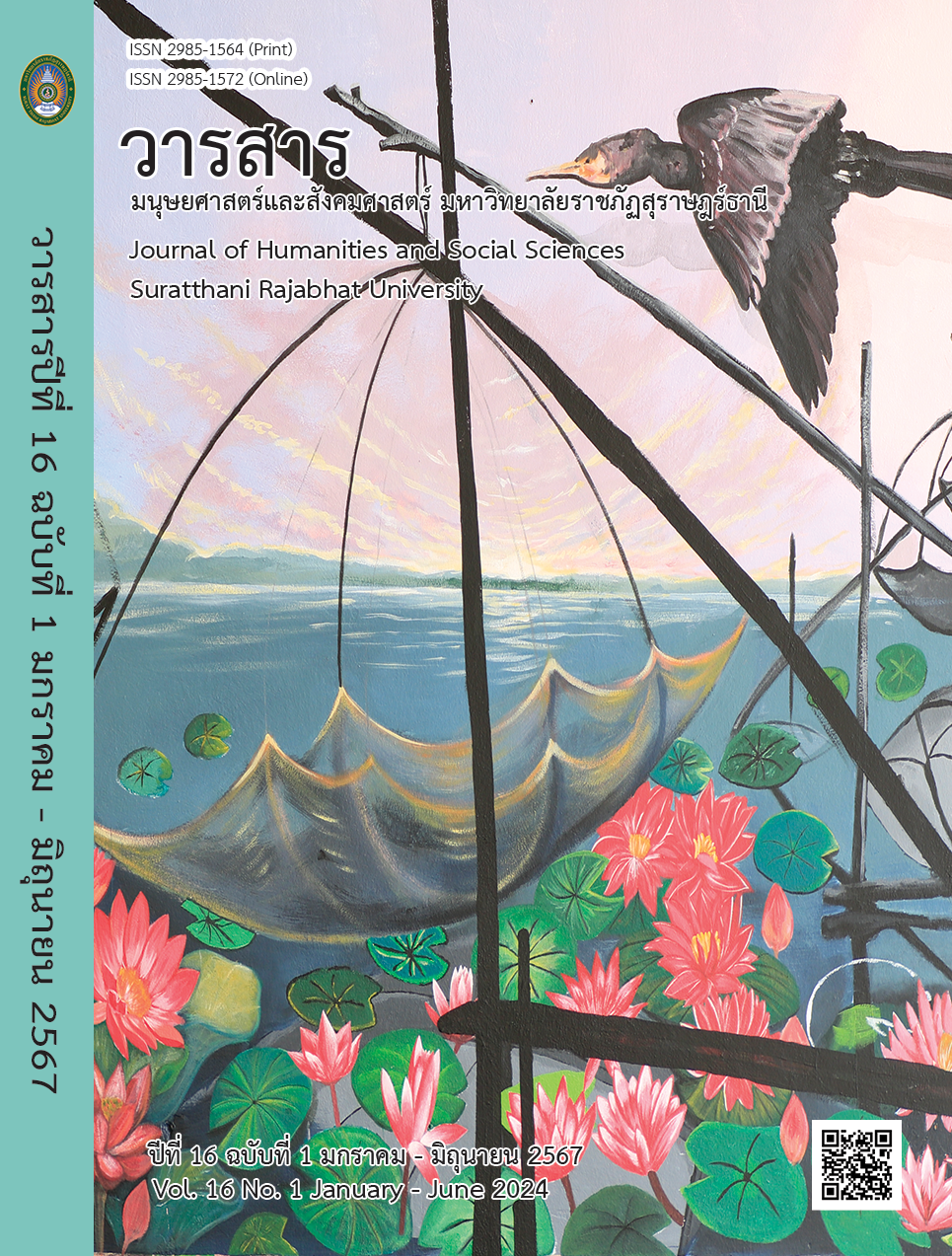A Study of The Changes in The Ban Songkhla Muslim Community, Talat Sub-District, Chaiya District,Surat Thani
Main Article Content
Abstract
This research article aims to study the history, change, and factors that resulted in the change of Ban Songkhla Muslim Community, Talat
Sub-district, Chaiya District, Surat-Thani Province. The research instrument collects data using qualitative research methods, such as surveys, interviews, and observations of relevant documents and research areas. The key informants were selected by purposive sampling. The data was analyzed with content analysis and presented the study's results in a descriptive analysis.
The research findings revealed that the Ban Songkhla Muslim
community is located in Talat Sub-district, Chaiya District, Surat Thani Province. Most of the community members have a history of being Muslims who
immigrated from their original area of Ban Hua Khao Daeng, Mueang Songkhla. Since its founding, the Ban Songkhla Muslim community has existed for at least 300 years. As time has passed, the people's way of life in the community has changed from the original practice. There are five important aspects that cause a change: 1) family, 2) career, 3) education, 4) language, and 5) religious traditions and culture. And the factors that affect the change of the community consist of two important factors: 1) internal factors, including the increase in the population living in the Ban Songkhla Muslim community, the need of job security and higher levels of education. And 2) external factors, including developments in education from the public and private sectors, development of public utilities and technology. The study results on changes in the Songkhla Muslim community provide an understanding of social conditions and
multiculturalism, knowledge of changing trends, and a database for
the study and sustainable development for multicultural community in the society.
Article Details

This work is licensed under a Creative Commons Attribution-NonCommercial-NoDerivatives 4.0 International License.
All published manuscripts have been verified by peer-peer professors in the fields of humanities and social sciences. Reprinting of the article must be authorized by the editorial staff.
References
จันทิมา อังคพณิชกิจ. (2561). การวิเคราะห์ข้อความ. กรุงเทพฯ: มหาวิทยาลัยธรรมศาสตร์.
เจริญ ศรประดิษฐ์, และ กอมารุดดีน ยีสา. (2548). ชุมชนชาวไทยมุสลิมในจังหวัด
สุราษฎร์ธานี: สุราษฎร์ธานี: สำนักงานคณะกรรมการวัฒนธรรมแห่งชาติ
กระทรวงวัฒนธรรม.
คณะทำงานการจัดทำแผนชุมชนบ้านสงขลา. (2550). แผนชุมชนบ้านสงขลา อำเภอไชยา
จังหวัดสุราษฎร์ธานี. อำเภอไชยา: จังหวัดสุราษฎร์ธานี.
ธานินทร์ สาลาม. (2547). บทบาทของสายสกุลสุลต่าน สุลัยมาน ชาห์ ในการปกครองของ
ไทยสมัยกรุงศรีอยุธยาตอนปลาย: ศึกษากรณีเมืองไชยา. วิทยานิพนธ์ ศศ.ม.
(อิสลามศึกษา). ปัตตานี: มหาวิทยาลัยสงขลานครินทร์.
พระพรหมคุณาภรณ์ (ป. อ. ปยุตฺโต). (2555). กาลานุกรม พระพุทธศาสนาในอารยธรรม
โลก (พิมพ์ครั้งที่ 6/1). กรุงเทพฯ: มหพันธ์ไฟเบอร์ซีเมนต์.
พระมงคล สุมงฺคโล. (2560). การเปลี่ยนแปลงทางสังคมที่มีต่อวิถีชีวิตชนเผ่าละว้า หมู่ที่
ตำบลป่าแป๋ อำเภอแม่สะเรียง จังหวัดแม่ฮ่องสอน. วารสารพุทธศาสตร์
ศึกษา, 8(2), 64.
เมธิรา ไกรนที, วันชัย ธรรมสัจการ, และ อุทิศ สังขรัตน์. (2563). ครอบครัว: สถาบันหลักทางสังคม
สถาบันหลักทางสังคมกับบทบาท 3 การพัฒนามนุษย์แบบองค์รวม. วารสาร
ปาริชาต มหาวิทยาลัยทักษิณ, 33(1), 6.
ฤทัยชนก ห่วงจริง. (2551). สถานภาพความรู้เรื่อง “ศรีวิชัย” ในประเทศไทยในรอบ 30 ปี
ที่ผ่านมา (2520-2550). วารสารประวัติศาสตร์, 33, 15.
สุดฤทัย พงษ์ประเสริฐ. (2562). การศึกษาการเปลี่ยนแปลงชุมชนปกาเกอะญอ ชุมชนบ้าน
แม่เหาะ อำเภอแม่สะเรียง จังหวัดแม่ฮ่องสอน. วารสารปัญญา, 26(1), 88.
สุภางค์ จันทวานิช. (2554). วิธีการเก็บข้อมูลในการวิจัยเชิงคุณภาพ (พิมพ์ครั้งที่ 19).
กรุงเทพฯ: ด่านสุทธาการพิมพ์.
อาแว มะแส, บัญชา สมบูรณ์สุข, มาลี สบายยิ่ง, และ อาหามะ ดือราแม. (2550).
กระบวนการทันสมัยกับการปรับตัวในการดำรงชีพในชุมชนชนบท. เอกสาร
ประกอบการนำเสนอในที่ประชุมวิชาการ. 29-30 (1), 76-77. ใน 2007 Southern
Thailand English Language Teaching/Culture Change Conference.
สงขลา: คณะศิลปศาสตรวิทยาลัยสงขลานครินทร์.
บุคลานุกรม
ณรงค์ ร่าหมาน (ผู้ให้สัมภาษณ์) นูรูลฮูดา เจะเลาะ (ผู้สัมภาษณ์). ณ ชุมชนมุสลิมบ้าน
สงขลา ตำบลตลาด อำเภอไชยา จังหวัดสุราษฎร์ธานี. เมื่อวันที่ 26 ธันวาคม 2563.
รุสดี วิชา (ผู้ให้สัมภาษณ์) นูรูลฮูดา เจะเลาะ (ผู้สัมภาษณ์). ณ ชุมชนมุสลิมบ้านสงขลา
ตำบลตลาด อำเภอไชยา จังหวัดสุราษฎร์ธานี. เมื่อวันที่ 19 ธันวาคม 2563.
สวัสดิ์ กูรูเฝียะ (ผู้ให้สัมภาษณ์) นูรูลฮูดา เจะเลาะ (ผู้สัมภาษณ์). ณ ชุมชนมุสลิมบ้าน
สงขลา ตำบลตลาด อำเภอไชยา จังหวัดสุราษฎร์ธานี. เมื่อวันที่ 19 ธันวาคม 2563.
สุรชัย กูรูเฝียะ (ผู้ให้สัมภาษณ์) นูรูลฮูดา เจะเลาะ (ผู้สัมภาษณ์). ณ ชุมชนมุสลิมบ้าน
สงขลา ตำบลตลาด อำเภอไชยา จังหวัดสุราษฎร์ธานี. เมื่อวันที่ 26 ธันวาคม 2563.
อัคเดช กรีมละ (ผู้ให้สัมภาษณ์) นูรูลฮูดา เจะเลาะ (ผู้สัมภาษณ์). ณ ชุมชนมุสลิมบ้าน
สงขลา ตำบลตลาด อำเภอไชยา จังหวัดสุราษฎร์ธานี. เมื่อวันที่ 26 ธันวาคม 2563.
เฮ็นดุลราไทร รุงดาอุเสิฟ (ผู้ให้สัมภาษณ์) นูรูลฮูดา เจะเลาะ (ผู้สัมภาษณ์). ณ ชุมชน
มุสลิมบ้านสงขลา ตำบลตลาด อำเภอไชยา จังหวัดสุราษฎร์ธานี. เมื่อวันที่ 4
พฤศจิกายน 2563.


